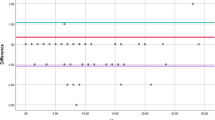Abstract
Introduction and hypothesis
The objective of this study was to translate the International Consultation on Incontinence Modular Questionnaire for female lower urinary tract symptoms (ICIQ-FLUTS) into Sinhala and validate the Sinhala translation for use in clinical practice.
Methods
The ICIQ-FLUTS was translated into Sinhala in accordance with the ICIQ validation protocol. The Sinhala translation was validated by administering it to 133 women with FLUTS, mainly urinary incontinence and or urgency, and to 118 women with symptoms other than FLUTS during the period 25 October 2013 to 23 December 2016, in the Academic Obstetrics and Gynaecology Unit, Teaching Hospital Mahamodara, Galle, Sri Lanka.
Results
The Sinhala translation had good content validity (assessed by a panel of clinicians including a content specialist, and a group of women with and without FLUTS), good internal consistency (Cronbach’s alpha coefficient in the range 0.69–0.75) was stable (no significant differences between median test–retest scores in a subgroup of 24 women with FLUTS), had good construct validity (marked difference between median scores in women presenting with and without FLUTS, p < 0.001), and good responsiveness (marked improvements between scores before and after treatment, p < 0.001).
Conclusions
The Sinhala translation of the ICIQ-FLUTS is valid and reliable for assessing Sinhalese-speaking women with FLUTS, especially urinary incontinence and/or urgency.
Similar content being viewed by others
References
Irwin DE, Milsom I, Hunskaar S, Reilly K, Kopp Z, Herschorn S, et al. Population-based survey of urinary incontinence, overactive bladder, and other lower urinary tract symptoms in five countries: results of the EPIC study. Eur Urol. 2006;50(6):1306–15.
Moller LA, Lose G, Jorgensen T. The prevalence and bothersomeness of lower urinary tract symptoms in women 40-60 years of age. Acta Obstet Gynecol Scand. 2000;79(4):298–305.
Chen GD, Lin TL, Hu SW, Chen YC, Lin LY. Prevalence and correlation of urinary incontinence and overactive bladder in Taiwanese women. Neurol Urodyn. 2003;22(2):109–17.
Hunskaar T. Epidemiology and natural history of urinary incontinence. In: Abrams P, Khoury S, Wein AJ, editors. Incontinence: 1st International Consultation on Incontinence, June 28-July 1, 1998, Monaco. St. Helier: Health Publications; 1999. p. 197–226.
Wanigasuriya JK, Wijewickrama ES, Jayasekara WM, Gunarathne N. Lower urinary tract symptoms; an undetected cause for morbidity in adults. Ceylon Med J. 2007;52:86–9.
Franzen K, Johansson JE, Andersson G, Pettersson N, Nilsson K. Urinary incontinence in women is not exclusively a medical problem: a population-based study on urinary incontinence and general living conditions. Scand J Urol Nephrol. 2009;43(3):226–32.
Girman CJ, Jacobsen SJ, Tsukamoto T, Richard F, Garraway WM, Sagnier PP, et al. Health-related quality of life associated with lower urinary tract symptoms in four countries. Urology. 1998;51(3):428–36.
Coyne KS, Sexton CC, Irwin DE, Kopp ZS, Kelleher CJ, Milsom I. The impact of overactive bladder, incontinence and other lower urinary tract symptoms on quality of life, work productivity, sexuality and emotional well-being in men and women. Br J Urol Int. 2008;101(11):1388–95.
Kupelian V, Wei JT, O’Leary MP, Kusek JW, Litman HJ, Link CL, et al. Prevalence of lower urinary tract symptoms and effect on quality of life in a racially and ethnically diverse random sample: the Boston Area Community Health (BACH) Survey. Arch Intern Med. 2006;166(21):2381–7.
Jenson JK, Nielson RF, Ostergard DR. The role of patient history in the diagnosis of the urinary incontinence. Obstet Gynaecol. 1994;83:904–10.
Korda A, Krieger M, Hunter P, Parkin G. The value of clinical symptoms in the diagnosis of urinary incontinence in the females. Aust N Z J Obstet Gynaecol. 1987;27:149–51.
Abrams P, Avery K, Gardener N, Donovan J; ICIQ Advisory Board. The International Consultation on Incontinence Modular Questionnaire: www.iciq.net. J Urol. 2006;175:1063–6.
Jackson S, Donovan J, Brookes S, Eckford S, Swithinbank L, Abrams P. The Bristol Female Lower Urinary Tract Symptoms questionnaire: development and psychometric testing. Br J Urol. 1996;77:805–12.
The International Consultation on Incontinence Modular Questionnaire. Validation protocol. http://www.iciq.net/validationprotocol.htm. Accessed 9 Apr 2017.
Hof M. Questionnaire evaluation with factor analysis and Cronbach’s alpha: an example. http://www.let.rug.nl/nerbonne/teach/rema-stats-meth-seminar/student-papers/MHof-QuestionnaireEvaluation-2012-Cronbach-FactAnalysis.pdf. Accessed 9 Apr 2017.
Author information
Authors and Affiliations
Corresponding author
Ethics declarations
Conflicts of interest
None.
Financial disclaimer
No funding was obtained for this work.
Rights and permissions
About this article
Cite this article
de Silva, G., Furukan, R. & Goonewardene, M. Validation of the Sinhala translation of the International Consultation on Incontinence Modular Questionnaire for female lower urinary tract symptoms among women in Sri Lanka. Int Urogynecol J 28, 1895–1899 (2017). https://doi.org/10.1007/s00192-017-3329-0
Received:
Accepted:
Published:
Issue Date:
DOI: https://doi.org/10.1007/s00192-017-3329-0




